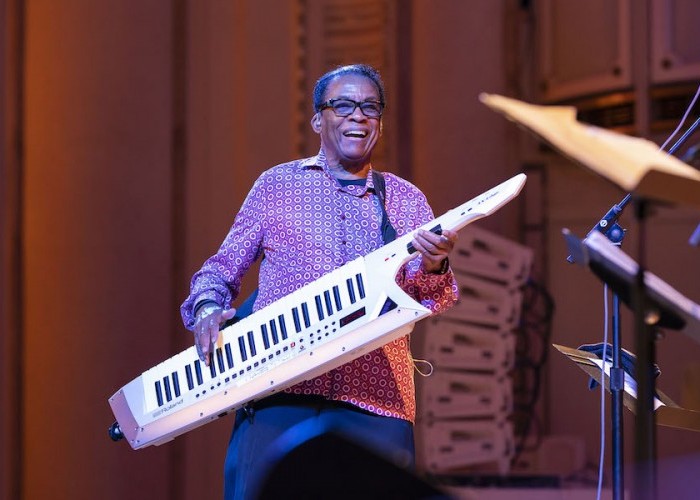Jan 13, 2026 2:09 PM
More Trump-Kennedy Center Cancellations
The fallout from the renaming of the John F. Kennedy Center for the Performing Arts to include President Donald…

Herbie Hancock, and his keytar, drew standing ovations during his Chicago homecoming concert.
(Photo: Clay Baker)As Herbie Hancock demonstrated in his recent return to performance, he is a musician of multitudes. The youthful 81-year-old NEA Jazz Master, UCLA professor, chair of the Herbie Hancock Institute of Jazz and UNESCO Good Will Ambassador for Intercultural Dialogue packed both his live-in-person quintet concert at Chicago’s Symphony Center on Sept. 2 (and the Detroit Jazz Festival show the next night, streamed rather than held in public as had been planned) with compositions, improvisations, keyboard investigations, artistic concepts and the leadership style he’s developed in a career spanning at least 60 years. His U.S. tour continues through the month.
In Chicago, an eerie, free-form episode that suggested Hancock’s early 1970s Mwandishi ensemble was the opener; in Detroit, Hancock made time to play “Windows” in dedication to his late “life-long best friend” and colleague Chick Corea. Otherwise, the set lists were similar, with in-the-moment variations of interpretation.
Sitting between two electric instruments and a Fazioli grand piano with his keytar nearby, Hancock switched among his voices and styles quickly, as if trying to fit them all in. He evoked the enduring quality of his 1960s Blue Note beginnings with the evergreen “Cantaloupe Island” and his funk-fusion pre-eminence with his hit “Chameleon,” arranged to sound like now, not then. After setting up themes on electric gear with his front line in closely focused voicings, and syncing with the rhythm team’s pocket, he frequently swiveled to play rich and driving chords on the grand. The mix of electric and acoustic instruments is often problematic, and in Symphony Center some piano nuances were lost in the overall sound, but viewed by a closeup camera online, Hancock’s harmonic sophisticated and finger fleetness stood out clearly.
Ever sensitive to musicians on the rise, Hancock arranged “Absolute Proof” as a set-piece featuring the soloistic talents of his guitarist-vocalist Lionel Loueke, flutist-vocalist Elena Pinderhughes, electric bassist James Genus and drummer Justin Tyson (who hit his kit hard, with tall baffles between him and his leader). Miles Davis spotlit Hancock, Wayne Shorter, Ron Carter and Tony Williams during their years in his employ with an air of diffidence; Herbie in contrast is vocal in his pride for his younger band members and generous in his accompaniment to them.
Loueke sang in an African language of his native Benin and scatted playfully in addition to showing off his clipped and/or beady processed guitar sounds. Pinderhughes’ flute rode the treble lines tightly, her flute contributions virtuosic, her intonation so focused as to bear no hint of breath behind it. One climax of the Chicago event was her trading of fours with Hancock standing next to her, stage front, wielding his keytar.
Hancock, born and raised in Chicago, where he was recognized as a prodigy, is clearly still enthusiastic about the instruments whose uses he pioneered. Besides his strap-held ax and various synths, he offered up one tune on vocoder. Aficionados of one facet or another of his career might carp they didn’t hear enough “Watermelon Man” or “Maiden Voyage,” “Future Shock,” anything from Speak Like A Child or Gershwin’s World or The Joni Letters. But this is a typical issue for artists trying to represent their many decades of original explorations in 90 or 120 minutes. Herbie Hancock’s audiences seem to be generally understanding about the problem, and unconcerned. In Chicago, he was greeted with a standing ovation and rewarded with the same at the concert’s end. DB

Belá Fleck during an interview with Fredrika Whitfield on CNN.
Jan 13, 2026 2:09 PM
The fallout from the renaming of the John F. Kennedy Center for the Performing Arts to include President Donald…

Peplowski first came to prominence in legacy swing bands, including the final iteration of the Benny Goodman Orchestra, before beginning a solo career in the late 1980s.
Feb 3, 2026 12:10 AM
Ken Peplowski, a clarinetist and tenor saxophonist who straddled the worlds of traditional and modern jazz, died Feb. 2…

The success of Oregon’s first album, 1971’s Music Of Another Present Era, allowed Towner to establish a solo career.
Jan 19, 2026 5:02 PM
Ralph Towner, a guitarist and composer who blended multiple genres, including jazz — and throughout them all remained…

Rico’s Anti-Microbial Instrument Swab
Jan 19, 2026 2:48 PM
With this year’s NAMM Show right around the corner, we can look forward to plenty of new and innovative instruments…

Richie Beirach was particularly renowned for his approach to chromatic harmony, which he used to improvise reharmonizations of originals and standards.
Jan 27, 2026 11:19 AM
Richie Beirach, a pianist and composer who channeled a knowledge of modern classical music into his jazz practice,…